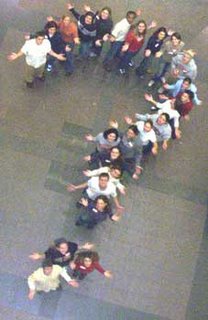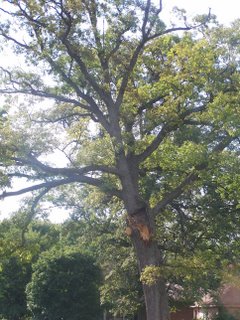Isn't New Jersey the state the shut down it's government over a budget impasse?
This may explain why. If the state legislature has nothing better to do than this, then it is no surprise that their state is a mess. What a waste of tax dollars.
It seems the link is password protected. Here is the article from the August 9 Wall Street Journal.
Naming a State Dirt
Just Doesn't Wash
With New Jerseyites
'Downer,' the Candidate Loam,
Can't Get Senate Notice;
Enemy of Lawn and Order
By BARRY NEWMAN
August 9, 2006; Page A1
TOMS RIVER, N.J. -- As its license plates affirm, New Jersey is the Garden State. Where does its garden grow? It grows in dirt, which is why asking the state legislature to designate an official New Jersey state dirt sounded like a nice idea to David Friedman.
"It connects plants and animals and water and everything," said Mr. Friedman, a tall 55-year-old who runs the Ocean County soil-conservation district, here on the coastal plain between New York and Atlantic City. On a hot afternoon, he was driving his Subaru toward the broad, burnt lawn of the East Dover Baptist Church.
![[David Friedman]](https://lh3.googleusercontent.com/blogger_img_proxy/AEn0k_tXn6w6QNovYIvekeuyilkAosYAv2_r1C81v78-f9p74pZr1AS42EFLM-UqGSbqPy9XYe--Nldsf4OlfVjTalmSbj6TTOYlkb4MEdhNesRUIgo0C_A41zMqWHm0Llt6ZGOTupvOSOeneDks2TTfIEdg2kHM=s0-d)
"What's beneath our feet," Mr. Friedman continued, "is a whole other world of earth and worms and...help me out, Chris."
"And roots and organisms," said Chris Miller, a specialist with the U.S. Agriculture Department who was on an inspection tour; he was riding in the back seat.
"They all serve," Mr. Friedman said. "If we manage what's below our feet, it's going to benefit mankind."
The sentiment appealed to Douglas Fisher, chairman of the state Assembly's Agriculture Committee. Encouraged by Mr. Friedman, he co-sponsored a bill naming a sandy loam called Downer soil as New Jersey's official dirt. Also known as "sugar sand," Downer blankets Ocean County; it's the commonest dirt in the state.
By unanimous vote, the Assembly passed the bill in May, prompting local resident Jay Lomberk to write to the Asbury Park Press: "State dirt? Are you kidding?" And another local, Jackie Daly, to write: "If it weren't so pathetic, it would be funny." There were lots of editorials, too.
Mr. Fisher is sure the mockery explains why no senator followed his dirt bill with one in the state's upper chamber. Earlier this year, Mr. Fisher nominated the tomato as New Jersey's official vegetable. The tomato is a fruit, but Mr. Fisher cited a U.S. Supreme Court decision from 1893 to prove that tomatoes are vegetables in the eyes of the law.
"The tomato didn't go anywhere, either," he says. "Didn't even pass the Assembly. Legislators think these bills make them look stupid. You can reduce anything to folly if you keep working at it."
Hard at work across America, state legislatures have lately ordained official fossils, odes, dogs and doughnuts. Bob Akerle of Netstate.com, a Web site that tracks these bills, says his count of new proposals is nearing 60 for this year. Where official symbols once stopped at flags, flowers and anthems, they total in the hundreds now. A few months ago, South Carolina made boiled peanuts its official snack food. Hawaii just installed the humuhumunukunukuapua'a as its official fish.
United Square Dancers of America has lobbied Congress to make the square dance a national symbol, alongside the flag, the rose and the bald eagle. "What with the war, we were not able to pass it," says Alitia Becker, the group's Plains region vice president. But it has persuaded 31 state legislatures -- New Jersey's included -- that they need an official folk dance, and that the square dance is it.
Until July 1, only Vermont had an official pie (apple). Now Florida has passed a pie act (Key lime) and the American Pie Council has hopes for pecan (Georgia) and cherry (Michigan). "People like to invoke a feeling of America," says Linda Hoskins, the pie council's executive director. "Nothing invokes America like pie."
Sure enough, but even officialdom can get fed up. Florida's lawmakers saw no use for a state rock; Ocala limestone met defeat in April. Last month, Louisiana Gov. Kathleen Blanco vetoed the newly written "I Love My Louisiana" as state poem, citing its lack of literary merit. In March, the Utah Legislature killed the rattlesnake's bid for state reptile.
Unlike rocks, snakes and poetry, the official-dirt movement, a loose amalgam of soil scientists, had run into little resistance up to now. Florida named a dirt (Myakka) in 1989. West Virginia did it (Monongahela) in 1997, and Illinois (Drummer) in 2001. Georgia is getting set to name red clay. All told, 21 states have honored dirt.
"There's no financial motivation, like there is with pie," Mr. Friedman was saying as he drove up to the Baptist Church and parked at the curb. He opened his trunk, got out a rubber-handled steel spike and added: "I don't think this should be a controversial issue in New Jersey."
Except for one thing: Mr. Friedman's homage to Downer soil also happens to be a philosophical challenge to what federal researchers recently identified as America's biggest crop.
The lawn.
At the East Dover Baptist Church, the lawn, initially planted in Downer, was now parched and firm. Mr. Friedman started across, paused, and jammed the spike as deep as it would go into the surface crust. It stopped at two inches.
"This is what happens in suburbia," said his colleague, Mr. Miller. Like lawns everywhere, this one had been flattened and turned during construction before it was grassed over. When dirt gets crushed, grass can't sink roots deep enough to drink up water from below; it has to be watered by hoses and sprinklers more and more. Because the dirt can't absorb it all, the water runs off into drains. In Ocean County, lawn fertilizer is then sluiced into barrier-island bays, helping breed algae that can starve fish of oxygen.
By contrast, under a pine stand in a far corner of the church lawn, a patch of Downer had survived in its spongy, primordial state. Mr. Friedman walked over and easily drove his spike up to the handle. He cleared the leaf duff with his book and scooped up two handfuls of the fragrant, sandy loam. "Plenty of pore space," he said, and Mr. Miller added: "It's best as woodland, a natural woodland soil."
Once, Ocean County was almost all woodland, and its population included 2.6 million hens. It has 500,000 people now, most in houses with lawns, plus 93 gated subdivisions for retirees and more on the way.
"Lawns," said Mr. Miller from the back seat as Mr. Friedman drove west toward Lakehurst. "Personally, I don't know what the draw is." The Subaru passed a string of "active adult communities," their new houses standing on treeless greensward. "That's how they build," Mr. Friedman said. "They clear everything."
He stopped at the edge of a future old-age compound called "River Pointe." Banners with pictures of smiling couples hung from poles. Behind them lay 165 humpy, windblown acres. Root-rakers had pulled out the scrub oak and pitch pine. Graders had sheared off the topsoil and stockpiled it. A backhoe was digging a storm drain.
Two surveyors stood at the roadside. Mr. Friedman walked over to introduce himself and offer his views on lawn abuse. "That was Downer soil," he said, looking over his shoulder. "It no longer is."
"Unfortunately, I'm responsible for clearing this," said one of the surveyors, Doug Falkinburg. "That's progress."
Mr. Friedman brought up his legislative campaign, pointing out that New Jersey has a state bird (goldfinch), a state tree (red oak) and a state dinosaur (Hadrosaurus foulkii), but no state dirt, the thing that holds it all together. "People didn't see the value," he said, mentioning that Downer, which almost covers the southern half of the state, was the candidate.
As Mr. Friedman left, the surveyor watched silently, and then he gave the dirt a kick. "Hey, I'm a South Jersey guy, too," he called out. "You got my vote!"
Write to Barry Newman at barry.newman@wsj.com1














